The SEO vs SEA question makes sense.
After all, both marketing strategies involve search engines.
And both offer unique benefits to businesses.
However, as a business owner trying to reach an online audience, you want to know which one’s better for you.
What if you could use both? How to choose between the two if you’re on a budget?
Questions like these can put a stop to your marketing efforts.
And no business owner wants that.
In this SEO vs SEA comparison guide, we’ll tell you:
- Their differences and benefits
- When should you use SEO
- When should you use SEA
- How to Leverage both for maximum results
Let’s dive in.
SEO Vs SEA: Which One Is Better for Your Business?
Here’s a quick overview of both.
SEO Vs SEA: Meanings
What is SEO (Search Engine Optimization)?
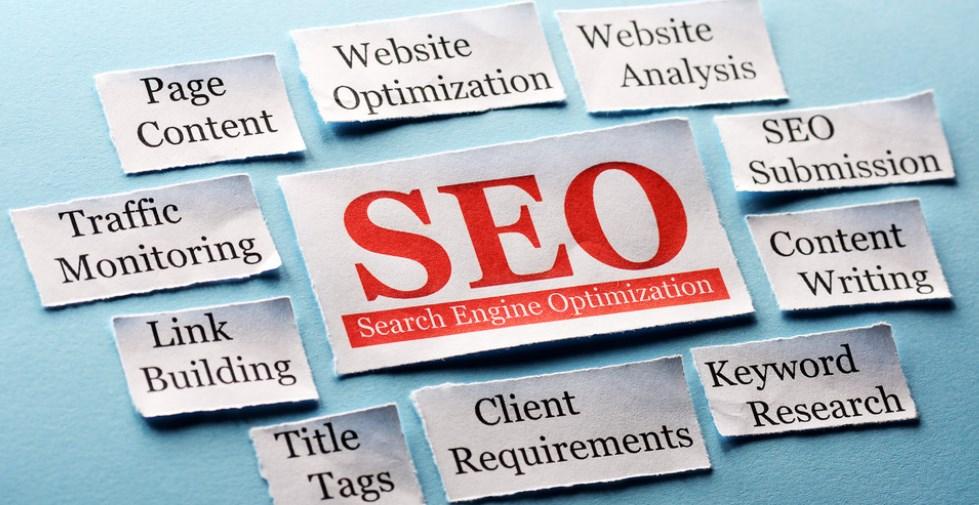
Search engine optimization refers to any actions you take to improve your website’s organic ranking on Google and other search engines.
SEO is generally categorized into three sections:
Technical SEO
Strategies that help you make your site easily crawlable by search engines fall under the umbrella of technical SEO.
For instance:
- Registering your website on Google Webmasters
- Installing an SSL certificate to keep your website safe and secure
- Making sure your site loads quickly
- Keeping your web pages mobile-friendly
- And more
On-Page SEO
As the name suggests, on-page SEO caters to everything that’s related to the content on a web page.
For instance:
- Optimizing your content for a target keyword
- Using ALT tags in images
- Keeping the navigation user-friendly
- And more
Off-Site SEO
The goal of an off-site SEO strategy is to:
- Spread the word
- Build authority, and in turn, rank higher through quality backlinks
So, basically, off-site is all about getting others to link to your website.
There are essentially two ways to go about link-building:
- Create awesome content that readers would like to share and link to
- Reach out to webmasters in your industry
Now, although Google wants you to stick with the first method, it could take years to build authority that way.
Instead, what you want to do is be proactive and grab every backlink opportunity.
What is SEA (Search Engine Advertising)?

Search engine advertising simply refers to the placement of ads on search engines like Google.
These results are shown above organic results and can easily be identified as paid ads.

These ads are run on the pay-per-click advertising model.
This means anytime someone clicks on one of these ads, the advertiser has to pay a pre-determined amount.
Now, there are generally four things that are at play in PPC advertising:
Your Bid Amount
It’s the amount you’re willing to pay the search engine for every single click.
So, a $2 bid would mean spending $2 to generate a single click.
But, the bid amount isn’t the only important ad ranking factor.
For instance, Google’s ad quality score takes three more factors into account.
Ad Relevance
User experience is something Google doesn’t compromise on.
So, your bid alone can’t put your ad at the top if it’s not relevant to the audience.
Ad relevance just means that your ad matches the intent behind a particular query.
For instance, you don’t want to advertise a product for an informational intent keyword.
Expected Click-Through Rate
This is where Google measures the effectiveness of your ad before deciding if it’s good enough to be served to the audience.
Expected CTR just reflects the number of clicks divided by the total impressions an ad receives.
So, a good CTR means that enough people are clicking on your ad after seeing it.
Landing Page Experience
The third factor Google looks at in an ad auction is the relevance of the landing page you’re redirecting the users to.
So, ask yourself, is the content on your landing page relevant to the content of your ad?
By now, you know what SEO and SEA mean.
Let’s look at the differences that might make SEO a better option for your business and vice versa.
Differences Between SEO and SEA
SERP Positions
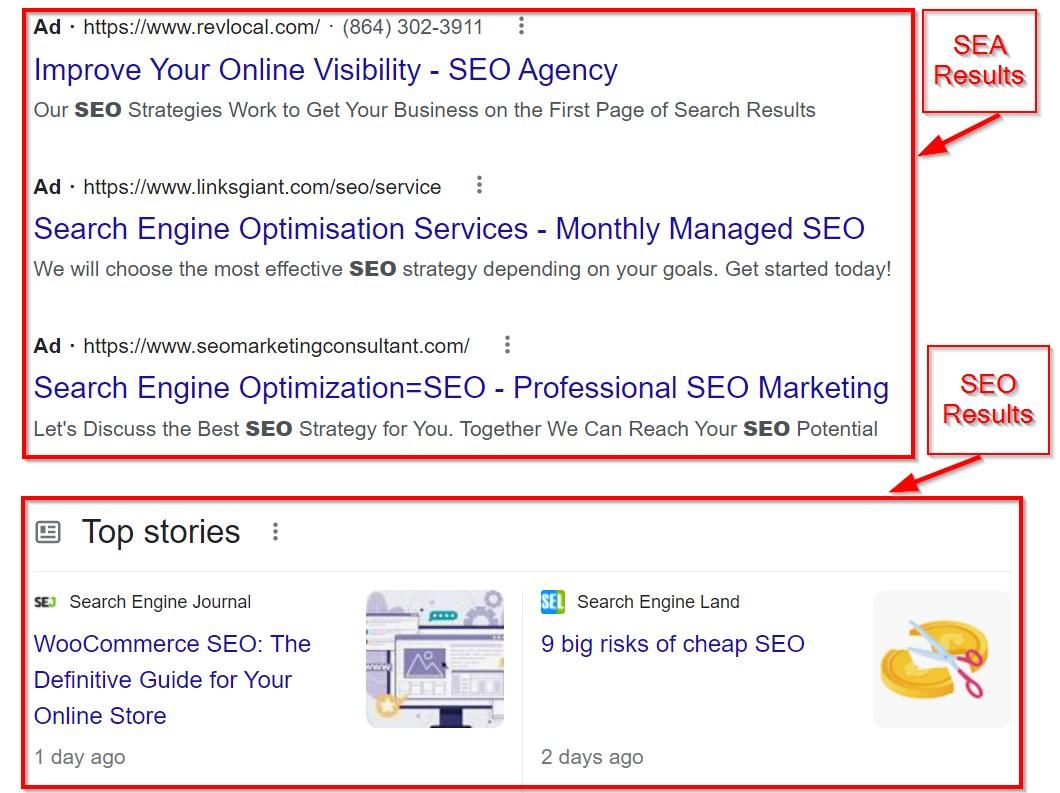
A search engine ad is served at the top, above organic results.
This means searchers see ads before they can see web pages ranking through SEO.
It’s important to remember that the maximum number of ads Google shows per keyword is four.
So, if you see all the spots filled, know that the keyword is competitive.
Impressions and Clicks
As a result of better visibility, paid ads naturally get more impressions.
And more impressions often lead to more clicks.
However, there’s a marketing concept called “Ad blindness” that’s also at play here.
Some people consciously or unconsciously ignore anything that looks like an ad.
So, expect to lose some of your audience to this psychological effect.
The use of adblockers worldwide doesn’t help the situation either.
According to Statista, 763.5 million people use adblockers.
This is not to say that paid ads aren’t effective.
But, it’s important to understand that if you don’t have to budget to invest in paid ads, SEO works, too.
Time Required to Rank
Now, SEA lets you put your business in front of your audience almost instantly.
You’ll just have to wait for Google to approve your ad.
However, as discussed earlier, the relevance of your ad and its landing page decides its SERP position.
SEO, on the other hand, requires time.
Especially if you try to rank for competitive keywords.
This is why finding the right keywords is one of the most important parts of SEO.
Investment
You need some upfront investment for search ads.
Plus, you’ll have to keep investing to generate consistent results.
Whereas SEO requires minimal investment and brings in long-term results.
But, again, you’re paying in the form of time and patience here.
Targeting
Both SEA and SEO let you target prospects but to varying degrees.
For instance, with Google Ads, you can target people based on their:
- Location
- Gender
- Online behavior
- Other psychographics and demographics
On the flip side, you can only target prospects based on what keywords they search.
So, when it comes to targeting a narrowed-down list of prospects, search engine advertising takes a lead.
SERP Features
SERP (Search engine results pages) features are characteristics of a search engine that can be used to provide additional information to the user.
For instance, you can showcase your phone number with Google search ads’ call extension.
Search ad platforms offer numerous SERP features to help you get clicks or generate conversions with your ads.
Organic results don’t lack in this department either.
For instance, “Featured Snippets” help users get the answer to their queries quickly.

This also helps businesses attract more traffic to their web pages.
Benefits of SEO
Long-term Results
This is inarguably the most attractive benefit of SEO.
Effective SEO ranks your website for the long term.
This translates to a consistent flow of traffic, and in turn, conversions.
The best part is when your website starts ranking, it requires minimal input from your side.
Requires Low Investment
Another SEO benefit that attracts a lot of small businesses and startups is that it’s a low-cost marketing strategy.
You don’t generally need a great budget to implement SEO on your website.
However, you do need to invest your time and energy to devise and implement an SEO strategy.
It’d be hard for you to focus on other aspects of your business if you handle your SEO as well.
So, the more efficient solution is to hire a resource that can take care of your site’s SEO needs.
Did you know you could get an in-depth technical audit report of your site just for $10?
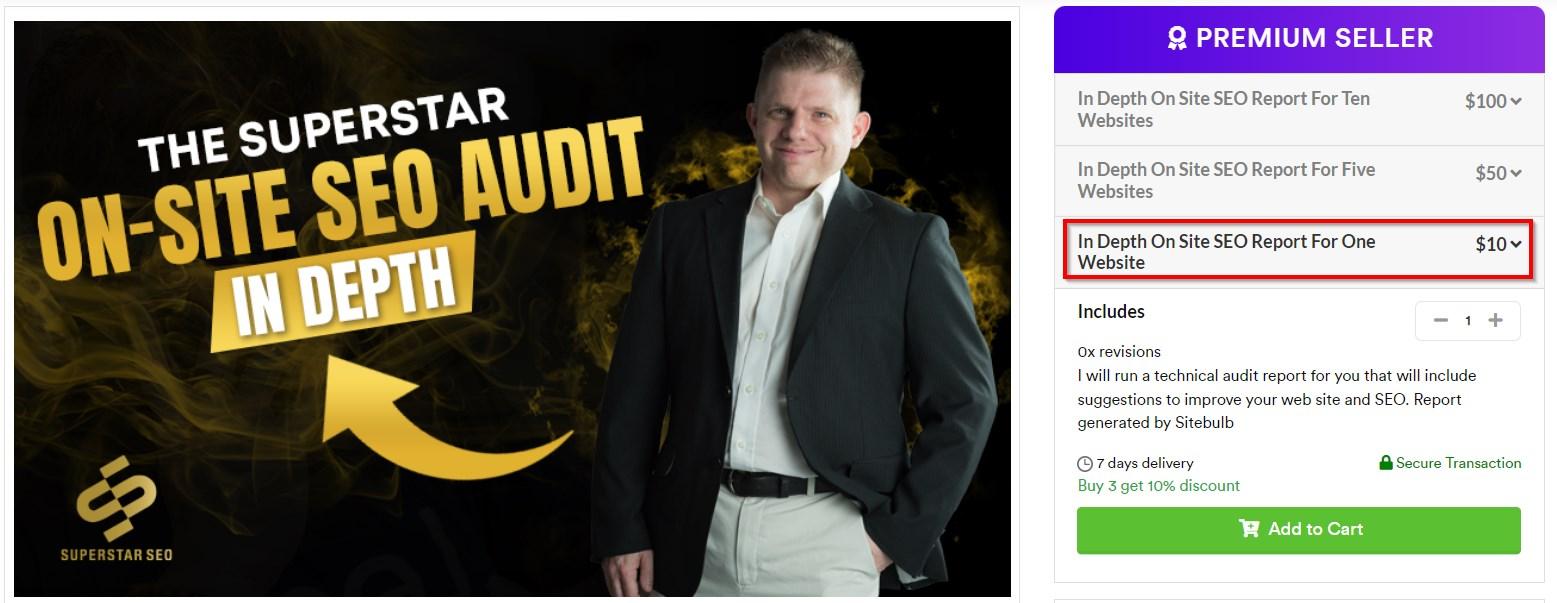
This technical audit report tells you where your site lacks in terms of SEO and suggests improvements.
Improves Brand Awareness
Brand awareness refers to the extent someone can recognize your brand while interacting with it.
SEO improves your website’s rankings, which in turn, improves your business’s visibility.
And increased visibility results in better brand recall.
So, even if your click-through rate isn’t good enough, you generate enough touchpoints by just being there at the top of Google’s first page.
Trackable
Google gives you powerful free tools like Google Search Console and Google Analytics to track your SEO progress.
However, as your site grows, you may want to invest in more advanced tools like Ahrefs and SEMrush.
Here are a few of the SEO metrics you can track with tools:
- Traffic
- Impressions
- URL indexing status
- Backlinks
- Keyword rankings
- Average time on page
- New vs returning visitors
- Page speed
- Bounce rate
- And more
With the right tools, you’ll know when your SEO strategies are working fine and when they need fine-tuning.
SEO Disadvantages (Challenges)
Takes Time
Unlike paid ads, where you can put your website on the first page of Google almost instantly, SEO takes time.
Depending on your industry and keywords, it could take you years before you can see significant results from an SEO strategy.
So, if you’re thinking of using SEO to grow your business, it’s a good idea to not rely on it solely.
It’s Tough to Crack Google Algorithms
One of the biggest challenges SEOs of this age face is the mysterious Google algorithms.
Google has been introducing algorithm updates on a regular basis.
You have to get used to the fact that SEO is a continuously changing industry.
And you need to keep yourself up to date on every new development in this industry.
With SEO out of the way, let’s take a look at the benefits and challenges of search engine advertising.
Benefits of SEA
Fast Ranking
With search engine advertising, you can start getting traffic to a web page immediately.
This is because an ad is placed above organic results for that same keyword.
It naturally gets more eyeballs.
So, if your business needs quick leads or sales, SEA would be a perfect option.
You only need to optimize your ad for:
- The right keyword (Affects the bid amount)
- Relevance (Ad + landing page)
Pay-Per-Click
Search engine advertisement works on the pay-per-click model, meaning that you only have to pay for ad clicks.
This means you will not have to worry about impressions.
Your goal, of course, is to get as many clicks as possible.
Because only then you’ll be able to persuade prospects to take action.
Unless, of course, you’re using an ad extension that prompts the user to contact you without having to click on the ad.
Google Call extension is a perfect example of that.
Quick Results
Whether you want to generate more leads or sell more of your products, SEA is one of the quickest ways to generate results.
So, as soon as your ad is live, you can expect the traffic to start pouring in.
Of course, converting that traffic is a whole other ball game.
This means your conversion strategy should also be strong enough to make your SEA campaigns successful.
Greater Control
Now, you need to have good control over your search engine ads. Why?
Because you’re paying the search engine for every single click.
You want these clicks from people that fall under certain criteria.
In other words, your ideal customer.
Plus, you need control over how your content is served to your audience.
Fortunately, Google gives you enough control to fine-tune your target audience.
For instance, you can narrow them down using different psychographics and demographics, including:
- Age
- Sex
- Location
- Online behavior
- Interaction with your business
- And much more
Plus, you get to control how your ad is served to your Google audience with different ad extensions, including:
- Product extensions
- Location extensions
- Seller rating extensions
- Call extensions
- And more
Disadvantages of SEA
No Long-term Results
Now, as soon as you pull the plug on your search engine ad, it stops working for you.
So, in order to keep getting leads, sales, or whatever it is you want, you’ll need to keep your ad running.
Can Get Expensive
An ad can get expensive pretty fast if you don’t put in the effort to properly optimize it.
You can reinvest a part of the profit you make from that very ad.
But, of course, your margins need to be good enough to make this strategy viable.
So, in addition to the ad amount, you may need to invest in an ad expert.
This isn’t a bad thing though; think about the losses you can face in case your ad strategy goes south.
Hiring an expert freelancer is the way to go if you’re not an ad expert, or just don’t want to risk losing marketing dollars.
Luckily, you don’t have to go far to find one.
Here’s a quick recommendation if you want to let an expert take care of your SEA.
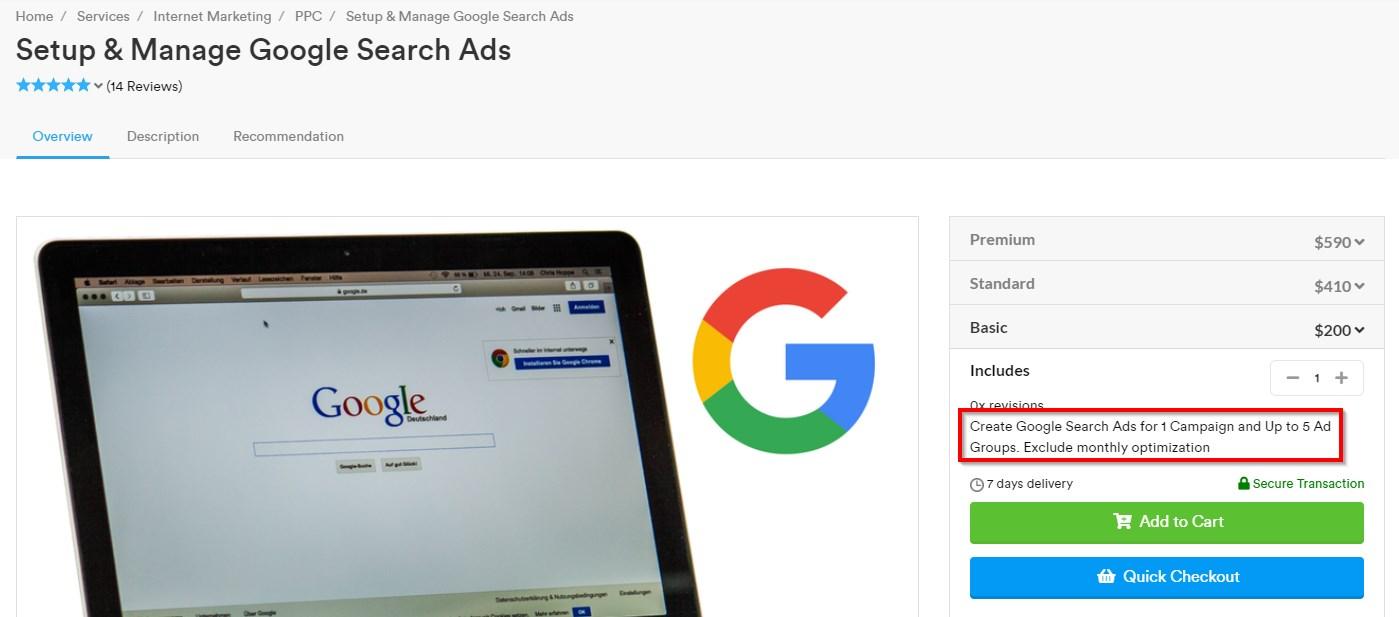
You Need Clicks to Rank
Remember the “Estimated click-through rate” metric? (Total ad clicks divided by total impressions)
Google takes this metric into account while ranking your ad.
So, let’s say a competitor is paying the same bid amount to rank for a keyword and their ad is as good as yours.
How do you think Google will know who to rank higher?
Estimated click-through rate.
A higher CTR translates to a higher search engine ranking. And that’s not only true in the case of SEA. CTR is an important metric for organic rankings as well.
When to Use SEO for Your Business?
So, who is SEO ideal for?
It depends. SEO is for you if:
You Want to Build Your Brand
Building a brand with pay-per-click ads can be super expensive.
You’ll have to invest a lot to generate enough touchpoints for brand awareness.
On the other hand, SEO provides free long-term exposure.
By ranking on multiple keywords, you can put your brand in front of the same prospect multiple times.
This improves your brand recall.
So, in addition to providing more traffic and leads, SEO can also help you achieve your branding goals.
You Want Long-term Results
If you’re in it for the long haul, consider investing in SEO.
Imagine getting a constant flow of leads and sales for years, without putting in any extra effort.
The initial input can be daunting in SEO since you don’t typically see any results in the first few months.
But, your patience pays off when you start attracting new customers on autopilot.
You’re on a Budget
Again, you don’t need a lot of investment to create and implement an SEO strategy.
This provides a level-playing field to all brands irrespective of their size and experience.
Of course, it’d be hard to beat a website with super-high domain authority.
But, your competitor is someone like you.
They are younger, low-competition sites that want to rank for the same keywords you do.
You don’t need a great budget to outrank your competitors, especially if you target long-tail keywords.
You Have the Patience
A common reason why business owners give up on SEO is the lack of patience.
Even when they realize SEO takes time.
But, let’s be honest. We want quick results.
So, it can be hard to work for months knowing you’re not going to get anything in return.
But, again, if you have the required patience, you can get amazing results with SEO.
When to Use SEA for Your Business?
You should never underestimate the power of search engine advertising.
And, at the end of the day, your goals decide whether you should invest in SEA or not.
So, SEA is for you if:
You Need Instant Results
There are times when you just can’t wait for SEO magic to work in your favor.
Sometimes, you need to put your brand in front of your target audience instantly.
For instance, a start-up needs a bunch of leads to get the needle moving.
Or, maybe you’re a local business trying to get your foot in the door.
Whatever it is that you want, if you want it quickly, search engine ads can help.
You Have the Budget
Sometimes, it’s just the lack of resources that can keep you from investing in Google ads.
If you have a decent budget, SEA would be a perfect way to drive traffic to your landing pages.
It’s important to remember that you don’t always have to invest in paid ads to generate results.
For instance, a single effective ad campaign could be enough if your goal is to generate quick leads for your business.
You Want More Control Over Targeting
Search engine advertising platforms like Google Ads give you great control over your target audience.
It’s no secret that Google has a lot of data on its users.
As an advertiser, you can use this data to inform your advertising campaigns and reach your ideal customers effectively.
SEO Vs SEA: When to Use Both?
By now, you should know the benefits and drawbacks of both marketing strategies.
If you have the resources, you can use both marketing strategies to achieve your marketing goals.
Outsource SEO and SEA
It’s always a good idea to let the experts take care of the marketing aspects of your business.
This lets you focus on the stuff that needs your attention.
Luckily, you don’t have to go anywhere else to find the best SEO and SEA freelancers.
Here are a few Legiit services you might like.
SEO Services
SerpAbove Guest Post Outreach
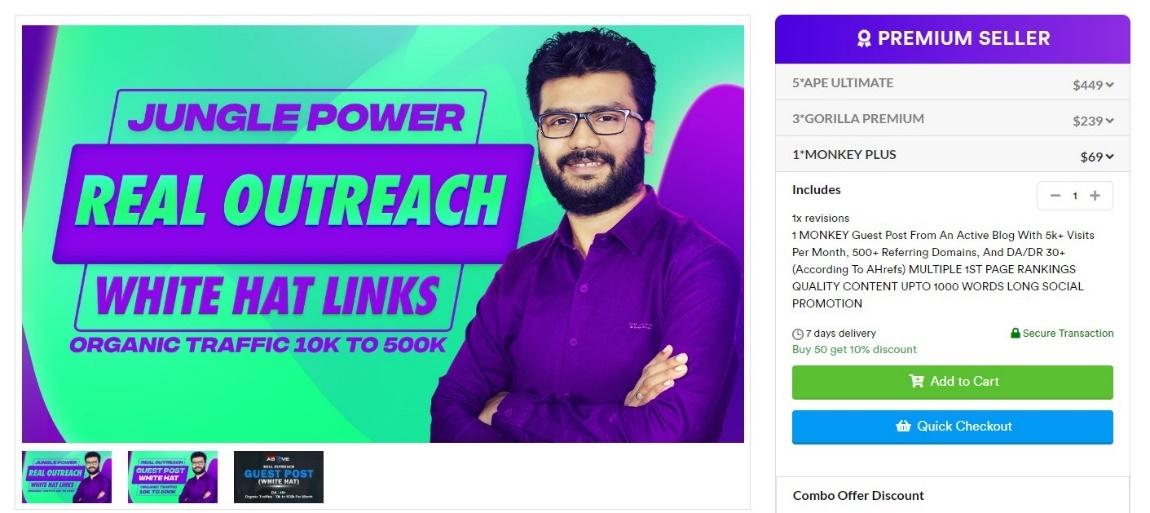
When it comes to link-building, nothing’s better than a high-quality guest post.
This guest post outreach service is perfect for you if you want to boost your website’s authority.
Done for You Monthly SEO
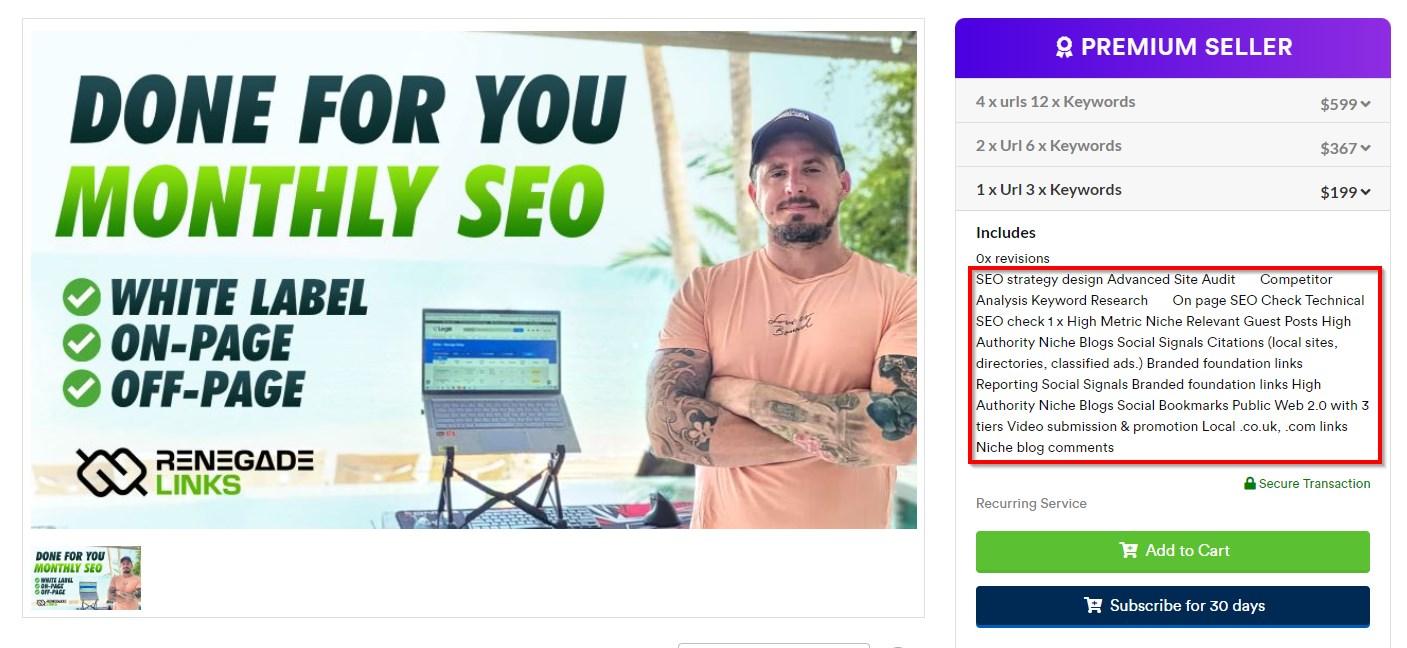
How about instead of outsourcing bits and pieces of your SEO strategy, you get an expert to take care of everything?
If that sounds like something you want, this done-for-you monthly SEO is all you need.
SEA Services
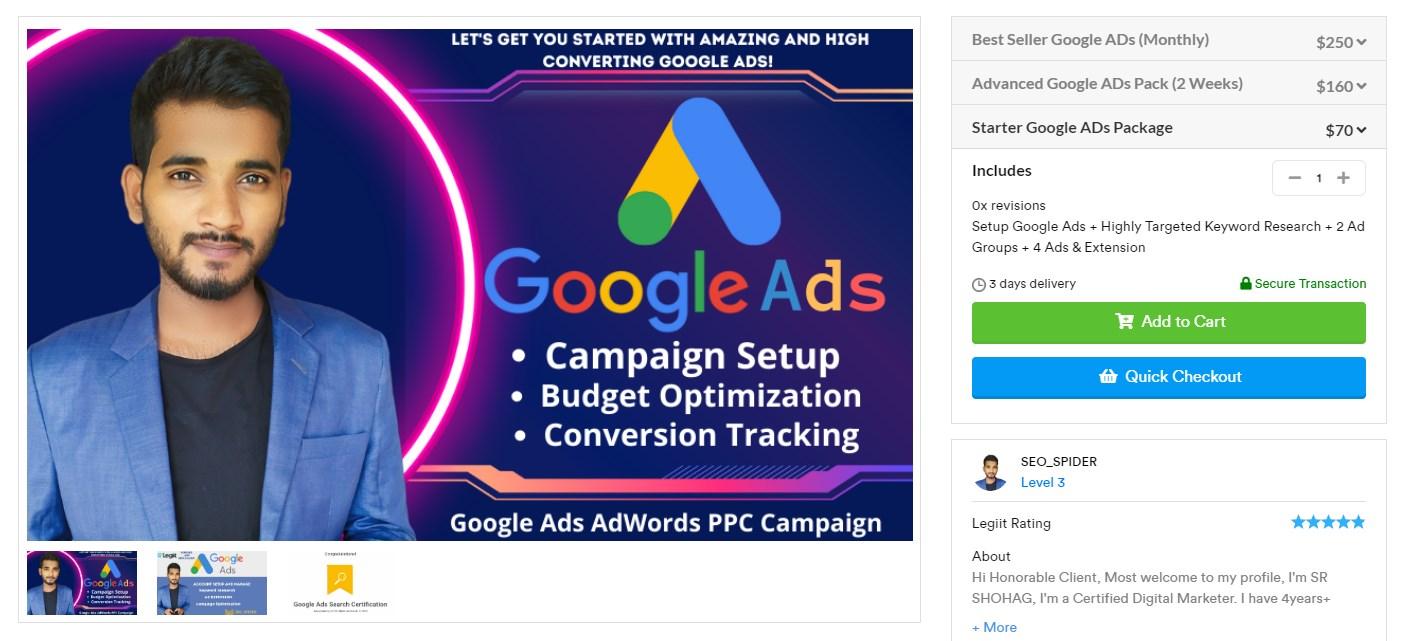
Google Ads Campaign by SEO Spider
If you want to set up a one-time Google Ads campaign, this service might interest you.
And since the service is super affordable, you won’t have to worry too much about losing your advertising dollars.
Setup & Manage Google Search Ads
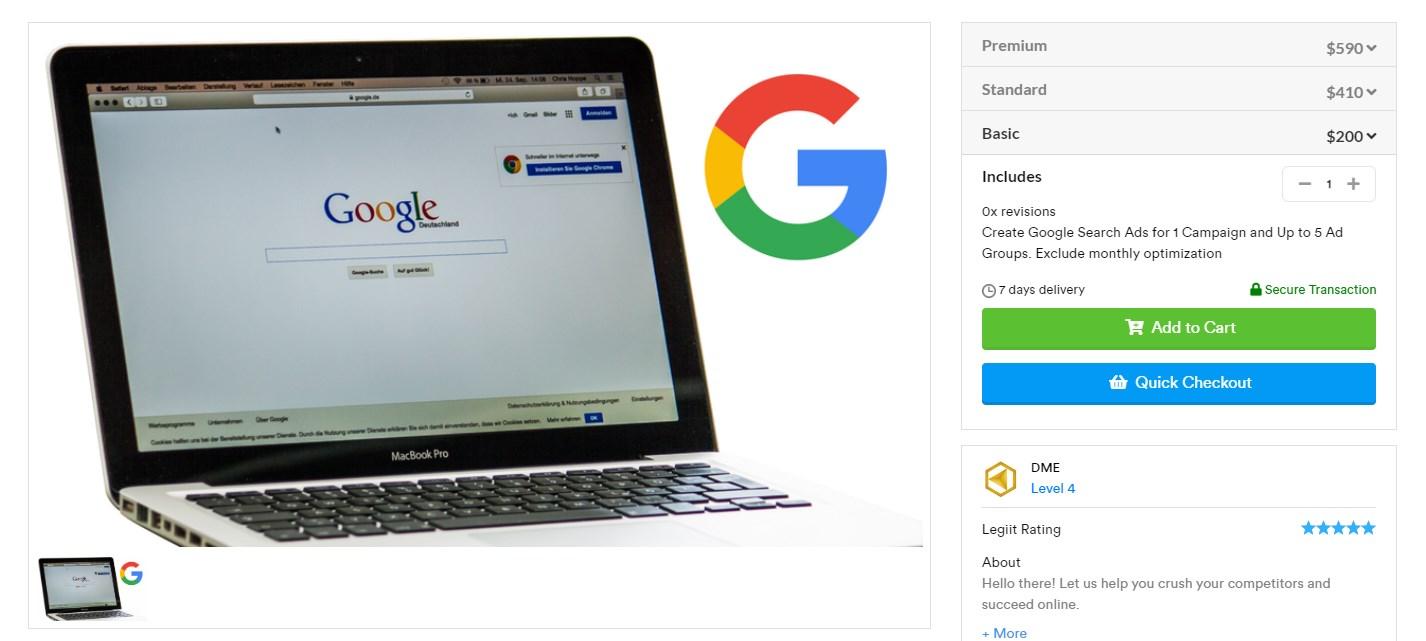
This service is for you if you need someone to set up and optimize your Google Search Ads campaigns.
On the basic package, you can get the service provider to set up 5 ad groups and optimize them on a monthly basis.
Conclusion: SEO Vs SEA
It’s hard to ignore the marketing benefits of SEO and SEA.
So, naturally, business owners are tempted to use both at the same time.
Thankfully, it’s perfectly fine to give in to the temptation.
However, you do need to hire the right resources.
Our freelance platform has every resource you’d need to grow your business with SEO and SEA.









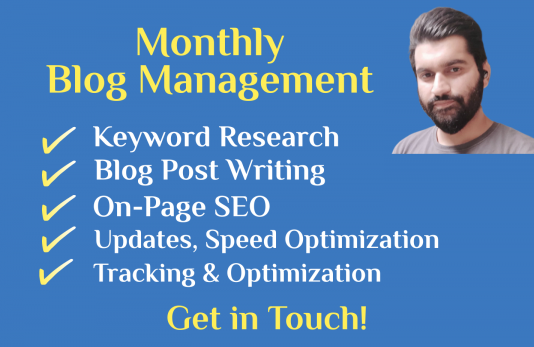



 Download
Download